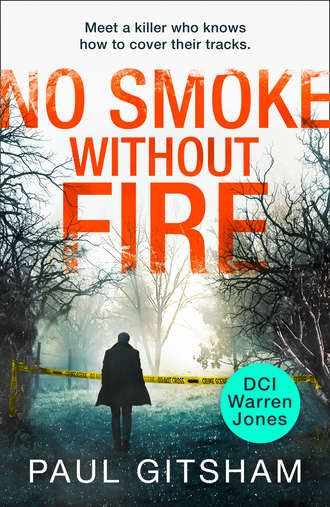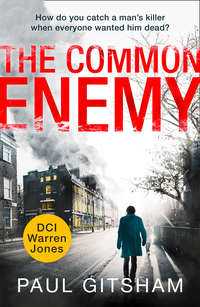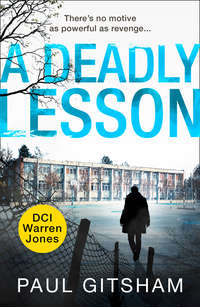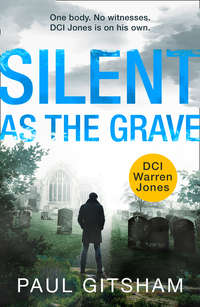
Полная версия
No Smoke Without Fire
Pargeter’s brow furrowed and he pinched his bottom lip between his thumb and forefinger, before, finally, taking his glasses off and rubbing them on his sleeve.
“I honestly don’t know. Twelve months ago I’d have said no chance. He was a physical wreck. He was overweight and smoked like a chimney. He could walk that distance, but he’d have struggled if he had to carry a shopping bag, let alone a body.
“But since then he’s been working on the farm, trying to make a business of it with Michael. He’s lost about three stone and cut right back on the fags. Last time I dropped in, he was wrestling hay bales off the back of a truck. He must have shifted a dozen whilst I was there; he was out of breath, but didn’t look in danger of a coronary. If he slung her across his shoulders in a fireman’s lift, then I reckon he might be able to do it.”
Warren made a note, before changing tack. “Tell me a bit more about his current situation. You said he’s back at the farm, but I thought his family had disowned him.”
“They did at first. His ex-wife never got over what he did and died a few years ago. Michael hated him at first, but after his mum died he realised that his father was the only family he had left. He received counselling and eventually started going to church himself. A couple of years ago, he visited his father in prison for the first time and was convinced that the old man wanted to change his life. They bought a bit more land from their neighbour and resurrected the farm. Michael has a good job and so they get by OK.”
“What about the local community? Twelve years isn’t that long.”
“The two of them largely keep themselves to themselves. When word first got around that Cameron was back a few things were sprayed on the front of the house and neither of them are welcome in the village pub, but it’s mostly died down. They tend to travel to Cambridge or Stevenage if they fancy a pint.
“The only place they are cautiously welcomed is at the village church. I’ve met the local vicar a few times and he’s taken it upon himself to help me keep Cameron on the straight and narrow. Nobody has invited them to join the choir, like, but they don’t get any bother.”
Warren looked at Sutton. Much of what Pargeter had said was of little relevance, he decided. Richard Cameron had been a very dangerous sexual predator and, as far as Warren was concerned, men like that had something fundamentally wrong with them. The urges that drove them were unlikely to ever disappear entirely. The question was, did Richard Cameron control those urges or did those urges still control him?
Chapter 17
Warren and Sutton drove to Cameron’s farm in a tense silence. Behind them, two police cars, each with a pair of uniformed constables, followed, lights and sirens off. Det Supt Grayson had drafted an arrest warrant, but Warren hoped to bring in the former convict voluntarily. Although the killing had now been reported in the local and national press, the details were scanty and it was possible that they would arrive before he caught the news.
Delaying any arrest would buy the police valuable time for questioning. The rules governing arrest were strict; the moment that a person was formally arrested, the clock started ticking. They would have twenty-four hours to either charge or release their suspect, on bail if necessary. A further twelve hours could be authorised by Det Supt Grayson, but beyond that a magistrate would need to be consulted. If Warren could get a few questions in before Cameron started making noises about legal representation and detention limits, so much the better.
The farm was at the end of a long, winding, single-track lane. Parked in front of the house were a vintage Land Rover and a far smarter Jaguar, presumably belonging to Cameron’s son.
The farmhouse was an old and weather-beaten affair. Two storeys in height, it looked as though it would need serious renovation in the next few years to survive the elements. Next door an even more rickety barn had its doors partially open. Parking the car so that it couldn’t be seen directly from the barn, Warren and Sutton stepped out into the chilly air. It was now late afternoon and Warren doubted they had much more than an hour’s daylight left. They’d have to move quickly.
Speaking quietly to the accompanying officers, Warren instructed them to spread out around the house to stop Cameron if he decided to make a run for it. With the officers in place, the two detectives walked cautiously towards the open barn. From inside they could make out the sound of a radio playing. Radio 4 by the sound of the presenter, Warren decided. There was a good chance he had heard the news, then. Warren stepped into the doorway, his eyes quickly adjusting to the gloom inside.
The barn was pretty much what he expected. Hay bales stacked against one half of the building made an improvised open enclosure amongst which a few hens — or were they chickens? Warren had no idea — strutted and pecked at the straw-covered floor. On the other side of the barn a wooden enclosure housed what looked — and smelt — like a few pigs. In the middle of the barn sat an old, rusty, Massey Ferguson tractor. Two legs clad in dirty grey corduroy trousers tucked into well-worn, muddy leather boots poked out from under the engine. The tractor had probably been assembled in part by one of his schoolmates’ fathers, Warren realised, back when Massey Ferguson was a major employer in his home town of Coventry. He shook off the feeling of sadness that passed through him. He’d been young at the time, but the closing of that plant had turned upside down the lives of many of the children he’d gone to school with. Some families never really recovered. The factory was a housing estate now.
“Richard Cameron?”
The legs jerked in surprise.
“It’s the police. We’d like to speak to you.”
There was a long pause, before finally the legs moved again. With a grunt, the body of a late middle-aged man slid out from under the vehicle. In his hand, he held a large steel spanner.
“Could you put that down, please?” asked Warren carefully.
Sutton had found the radio and switched it off at the wall socket; the clatter of the metal tool against the concrete floor echoed loudly through the shed.
“What do you want? I’m not due a visit until next week.”
“We’re not with the Probation Service. We’re here to ask you some questions in connection with an ongoing enquiry.”
“Am I under arrest? I ain’t going back to prison.” The man’s eyes darted wildly around the barn as his voice started to rise. His hands started to shake and his foot tapped. The man was clearly terrified at the prospect of prison. Were his fears justified?
Warren appraised the man standing before him. According to his file, Richard Cameron was days shy of his sixtieth birthday. The photograph in his file, taken just before his release, could have been of a man ten years older. Greying and stooped, the face in the picture was creased and lined. The man in front of him could pass for fifty. The green wax jacket that he wore was loose around the waist, suggesting recent weight loss, and his back was straightened. His face, though still craggy and battered, had more definition. His complexion had lost the greyish pallor of the long-term smoker and inmate and was instead pink, with a ruddiness to the cheeks that spoke of time outdoors. His beard, although grey and tinged with yellow around the mouth, was neatly trimmed. The man’s hands, he noted, were dirty and scabbed, but underneath the oil were the faint remnants of a summer tan. Life on the outside clearly agreed with Richard Cameron far more than life on the inside.
Warren spoke carefully. “At the moment, we just want you to answer some questions. However, I remind you that you are required to co-operate with the police under the terms of your parole. I have a warrant here for your arrest if necessary.”
“What’s going on here?”
The voice came from behind the officers and belonged to a young man in his late twenties or early thirties, Warren judged.
“And who might you be, sir?”
The question was unnecessary; the man was clearly his father’s son. Although taller and slimmer, he had the same broad shoulders and strong jawbone, visible despite a thick goatee beard. His hair was a dark brown, cut short, in an unfussy but neat style. Unlike his father, he wore grey suit trousers and smart leather shoes, his jacket an expensive-looking Gore-Tex affair. A collar and red tie peeked out above the partially unzipped front.
“Michael Stockley. I own this farm.” The man’s accent was clearly the same as his father’s, but his diction spoke of a better education and years spent in university and managerial workplaces, rather than low-paid, menial jobs and prison.
So he still goes by his mother’s maiden name, noted Warren.
“We are inviting your father to attend a voluntary interview at Middlesbury police station.”
Stockley curled his lip. “And you say that he hasn’t been arrested?”
“Not unless he refuses to co-operate — in which case I’ll serve the arrest warrant and contact his parole officer.”
Acknowledging his father for the first time since arriving, Michael Stockley nodded in his direction. “You aren’t under arrest, Dad. You don’t have to answer any questions. In fact say nothing until I’ve arranged a solicitor.”
The older man nodded mutely, looking scared and bewildered. Stockley turned back to Warren.
“I didn’t catch your name, Officer — nor have I seen any identification.”
Warren locked eyes with the man for several long seconds, before fishing out his warrant card, which he held up in front of the man’s face. Stockley nodded once.
“What’s this about?”
“Just some questions relating to an ongoing enquiry.” Warren had no intention of giving away any more information than he had to. He wanted to keep the man on the back foot for as long as possible.
“I believe that my father is entitled to have somebody with him during this questioning and that a solicitor may be present,” he all but smirked.
Warren didn’t like the way that this was going; he had to do something to shift the balance of power away from this smartly dressed amateur lawyer.
“Of course, assuming that Mr Cameron has something to hide, we can wait for a solicitor to arrive.” Warren nodded back to the older man, who paled slightly.
“The exercising of his legal rights should not be inferred as any admission of wrongdoing on my father’s part. And I believe that any attempt to deter him from seeking representation — or indeed questioning him before his solicitor arrives — would be contrary to the rules laid down in the Police and Criminal Evidence Act.” This time he did smirk.
On the other side of the barn he could see Tony Sutton rolling his eyes in disgust. Warren agreed. Spare us from barrack-room lawyers, he thought.
Sensing a victory of sorts, Stockley pressed on. “I suggest you return to your cars, Officers, whilst my father and I go into the house and call for his lawyer. I’ll let you know when he arrives.”
Warren shook his head slowly. “I don’t think so, Mr Stockley. I was rather intending to do this at the police station. You can wait for your lawyer there.”
Richard Cameron shook his head violently. “No, I’ve always said I’d rather die than set foot inside another prison cell and I mean it.”
“My father is undergoing questioning voluntarily,” Michael Stockley reminded them. “You cannot force him to attend the police station and you certainly can’t put him in a prison cell whilst he awaits his lawyer.”
Warren was getting impatient. “First, nobody has said anything about your father being placed in custody, let alone a cell. Second, I would remind you that I have a signed arrest warrant, so I certainly can compel him to attend the questioning. I’ll let you decide how you want to do this.”
The two men glared at each other. Finally, it was Richard Cameron who spoke up. “All right. Let’s get this done with. But I ain’t saying nothing until my brief arrives.” With that, he slouched out of the door, heading for the parked cars. At a signal from Warren, one of the uniformed constables opened the rear door of his patrol car.
“Mind your head,” he grunted, pushing down on the older man’s unruly mane.
Stockley stepped towards the car.
“Hold on, Michael.”
Now that he had them, Warren’s instinct was to minimise contact between father and son as much as possible. He didn’t like the way the younger man was calling all of the shots. Stockley blinked. “I’m accompanying my father to the police station.”
“Not in there, you’re not. Health and Safety,” he lied, motioning towards the remaining patrol car, whose driver stood by the open rear door like a chauffeur.
“Health and Safety? Bollocks!” He made as if to protest further, but Warren merely waved the arrest warrant in the air. With a sound of disgust, the younger man turned on his heel and marched towards the waiting car.
With both men locked in separate cars, Warren addressed the remaining officers.
“DI Sutton will co-ordinate the securing of the property and then return to the station. I want a search team standing by and ready to go in case he gives us enough to raise a search warrant. We need to move fast before his lawyer starts putting up the roadblocks.”
He turned to Sutton, who was smiling. “I liked the way you handled that, boss. His lawyer will be pissed, though.”
Warren shrugged. The man was a convicted rapist out on licence. His complaints would fall on deaf ears.
“Tough. More to the point, though, if we can’t get anything off Cameron in interview, we may have to let him go. And his lawyer will almost certainly challenge the grounds for any search warrant.” As an afterthought, he fished out his own car keys. “Drive yourself back rather than wait for a lift. I want you in on any interviews. I’ll keep Mr Cameron company on the way to the station.”
Chapter 18
By the time Cameron, Stockley and Warren arrived back at Middlesbury police station, Stockley had already telephoned his father’s solicitor. Although he wasn’t under arrest, Cameron was still processed by the custody officer, who reminded him of his rights and directed him to a small room to await his lawyer. He ostentatiously left the door wide open so that he could listen in to anything the father and son might say, a mute reminder that their conversation would not be subject to the same privileges that a lawyer and client would be entitled to.
Thirty minutes later, Cameron’s solicitor arrived. A portly, balding man in his late fifties, he’d not represented Cameron at his first trial — that solicitor had retired some years ago — but he had negotiated his release and the terms of his parole.
“What’s he in for? I understand he’s attended voluntarily for questioning, but you have an arrest warrant and have left a team in place should you be able to raise a search warrant.”
Warren shrugged. “Just doing it by the book — complete chain of evidence and all that.”
The solicitor grunted. “Not a lot of information for me to go on here, but I can read between the lines and I’ve heard the news. Can I see the arrest warrant?”
“No need, it hasn’t been served.” The arrest warrant contained details that Warren would only share if necessary.
The solicitor grunted again, letting it pass, although Warren was under no illusions that it would be forgotten about. Leading him towards the small room containing Cameron and Stockley, neither of whom had said a word yet, Warren let the door close behind him. Everything said inside that room would now be privileged.
Grabbing a coffee from the vending machine, Warren went to greet Sutton, who had just returned from the farm.
“The farmhouse is secure and a SOCO team are on standby.”
“Good, but don’t hold your breath. I’ve got a feeling that we aren’t going to get much from Cameron. That bloody son of his is too smart by half and his brief is pretty experienced also, by the look of him.”
“He is,” confirmed Sutton, who’d been at Middlesbury for years. “He’s pretty reasonable for a solicitor and knows when to fight his battles, but he does a thorough job and won’t stand any bullshit.”
“Well, then, let’s see what Mr Cameron has to say for himself.”
* * *
The opening volley of the interview came, unsurprisingly, from Cameron’s lawyer. Warren had led Cameron and his lawyer into the small interview room. Unexpectedly, Michael had opted to remain outside, leaving his father in the hands of his solicitor. After ensuring that the voice recorder was set up and that Sutton had read the man his rights, Warren had sat back, arms folded, and waited patiently. Cameron’s solicitor had started by complaining loudly and forcefully about his client’s treatment thus far.
In a two-minute diatribe he accused Warren and his officers of being on a fishing trip; of bullying Cameron into attending an interview ‘voluntarily’ by implying arrest if he didn’t do so, then making up bogus Health and Safety regulations to isolate his client from his accompanying adult.
Warren could almost see the quotation marks hanging in the air around the word ‘voluntarily’. When he’d finished he sat back in his chair.
Warren looked over at Sutton, who appeared to be in the process of picking his nose. A gesture that couldn’t be heard on the tape, it nevertheless clearly stated the officer’s contempt for the alleged trampling of the suspect’s rights that had just been outlined. Warren fought back a smile. Sutton had a style all of his own.
Ignoring what the solicitor had just said, Warren leant forward in his chair.
“Mr Cameron, can you tell us where you were on the evening of Friday second December?”
Cameron glanced towards his lawyer, licked his lips and mumbled, “No comment.”
Warren shook his head. “Come on, Mr Cameron. The sooner you answer our questions, the sooner you can go home.”
The lawyer leant forward. “May I remind the detective chief inspector that my client is here voluntarily and that he is in fact free to leave at any time. Nor is he under any obligation to say anything that may incriminate him.”
Warren nodded, as if conceding the point. “Absolutely right. Until — sorry — unless we arrest Mr Cameron, he is free to leave at any time. And of course you are right — Mr Cameron has no need to say anything that might incriminate him.”
He looked back at Cameron. “Can I assume that what you might have to say is incriminating?”
The lawyer’s response was swift. “No, you may not, as you well know. Failure to answer a question may not be seen as an admission of guilt.”
“Of course, you are absolutely right. However it is quite possible that if Mr Cameron can account for his whereabouts on the night in question, he might just remove himself from any suspicion.”
“That is a decision that Mr Cameron has the right to decide for himself and he should not be coerced.”
There remained a silence for a few seconds, before Warren pulled open an envelope. He carefully laid out several A4 photographs, face down onto the table.
“Let’s try something else. Are you familiar with the travel agents Far and Away?” Again Cameron glanced at his solicitor, before shaking his head. “No comment.”
“Perhaps you are familiar with one of its sales advisors, Sally Evans.” A flash of recognition appeared in the older man’s eyes before being carefully suppressed. “No comment.”
Конец ознакомительного фрагмента.
Текст предоставлен ООО «ЛитРес».
Прочитайте эту книгу целиком, купив полную легальную версию на ЛитРес.
Безопасно оплатить книгу можно банковской картой Visa, MasterCard, Maestro, со счета мобильного телефона, с платежного терминала, в салоне МТС или Связной, через PayPal, WebMoney, Яндекс.Деньги, QIWI Кошелек, бонусными картами или другим удобным Вам способом.







